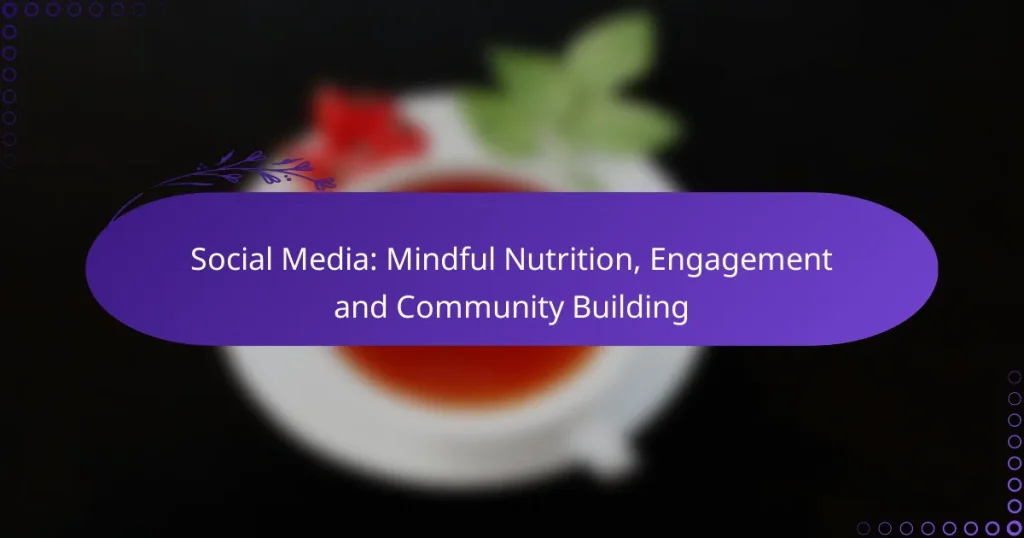Social media plays a crucial role in promoting mindful nutrition by raising awareness, providing valuable resources, and creating supportive communities. By sharing experiences and tips related to healthy eating, these platforms make nutrition more engaging and accessible. Effective engagement strategies, such as interactive content and live sessions, foster a sense of community, enhancing connections and encouraging participation among users.
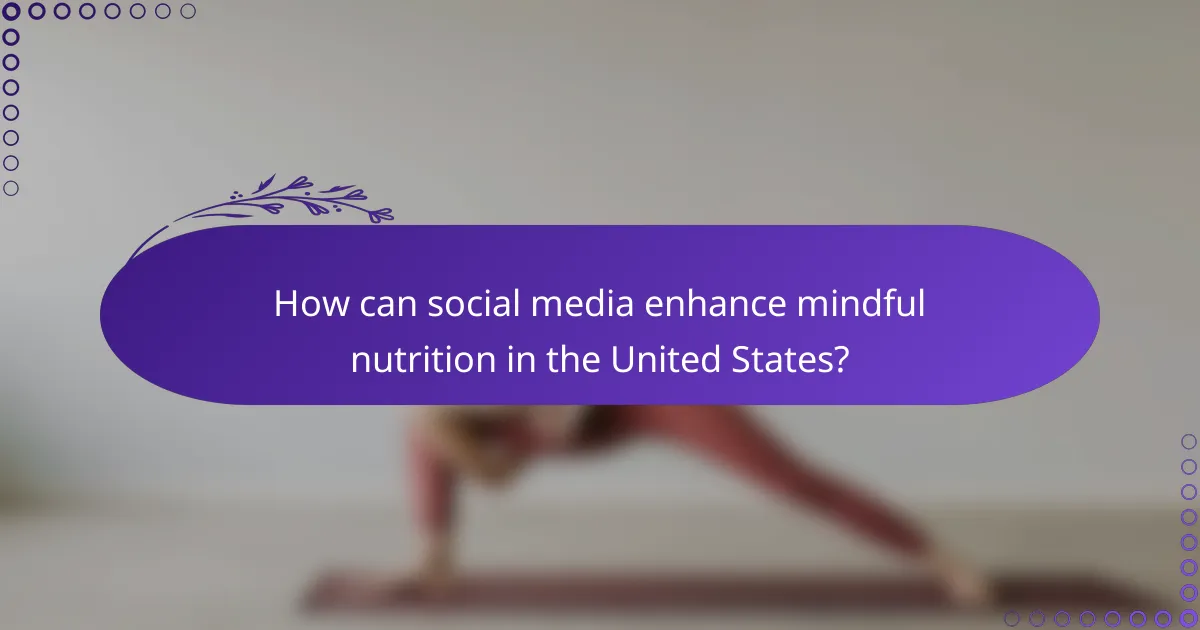
How can social media enhance mindful nutrition in the United States?
Social media can significantly enhance mindful nutrition in the United States by fostering awareness, providing access to resources, and facilitating community support. These platforms allow individuals to share experiences, tips, and information related to healthy eating, making nutrition more accessible and engaging.
Increased awareness of healthy eating
Social media platforms serve as powerful tools for increasing awareness of healthy eating habits. Users can follow nutritionists, dietitians, and health influencers who share valuable insights about balanced diets, portion control, and mindful eating practices. This exposure helps individuals make informed choices about their food consumption.
Engaging content such as infographics, videos, and live discussions can highlight the benefits of various foods, making it easier for users to understand the importance of nutrition. For example, a short video demonstrating how to prepare a healthy meal can inspire viewers to try new recipes and incorporate more whole foods into their diets.
Access to nutrition resources
Social media provides easy access to a wealth of nutrition resources, including meal plans, recipes, and educational articles. Many organizations and professionals share free resources that can help individuals navigate dietary changes and improve their eating habits. This democratization of information allows users to find guidance tailored to their specific needs.
For instance, platforms like Instagram and Pinterest are filled with healthy recipe ideas and meal prep tips, while Facebook groups often feature discussions on dietary challenges and successes. Users can easily save and revisit these resources, making it convenient to incorporate new ideas into their daily routines.
Community support for dietary changes
Community support is crucial for anyone looking to make dietary changes, and social media excels in creating supportive environments. Online communities allow individuals to connect with others who share similar goals, providing motivation and accountability. Users can share their progress, challenges, and successes, fostering a sense of belonging.
Participating in challenges or group activities, such as a 30-day healthy eating challenge, can further enhance this support. These initiatives encourage users to engage with one another, share tips, and celebrate milestones, making the journey toward mindful nutrition more enjoyable and sustainable.
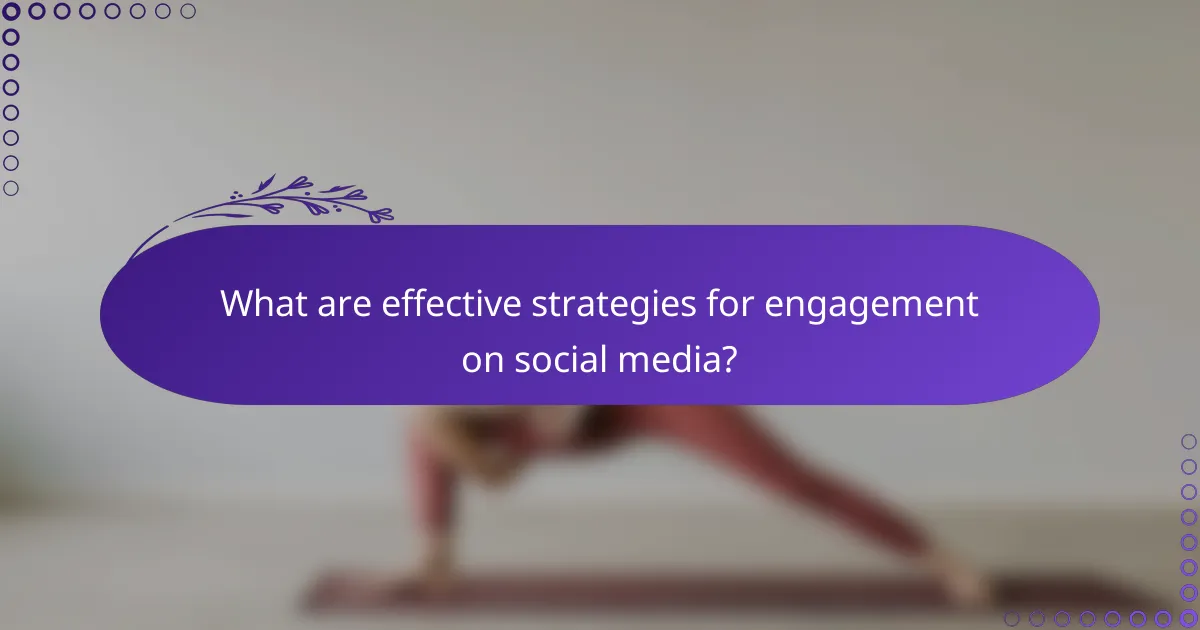
What are effective strategies for engagement on social media?
Effective strategies for engagement on social media include creating interactive content, hosting live sessions, and sharing user-generated content. These approaches foster community involvement and enhance connections with your audience, making them feel valued and heard.
Interactive content like polls and quizzes
Interactive content, such as polls and quizzes, encourages audience participation and can significantly boost engagement rates. These tools allow users to express their opinions or test their knowledge, making the experience enjoyable and informative.
For instance, a nutrition-focused quiz about healthy eating habits can attract followers and spark discussions. Aim to keep polls and quizzes concise, ideally under five questions, to maintain user interest and maximize responses.
Live Q&A sessions with nutrition experts
Hosting live Q&A sessions with nutrition experts can create a dynamic platform for real-time interaction. These sessions allow followers to ask questions directly, fostering a sense of community and trust in your brand.
Promote these events in advance to gather questions and ensure a good turnout. Consider scheduling them at times convenient for your audience, such as evenings or weekends, to maximize participation.
Sharing user-generated content
Sharing user-generated content (UGC) is a powerful way to engage your community and showcase their experiences. UGC can include testimonials, photos of meals, or stories about personal nutrition journeys, which help build authenticity and relatability.
Encourage your audience to tag your account or use a specific hashtag when sharing their content. This not only increases your visibility but also fosters a sense of belonging among followers, as they see their contributions recognized and valued.
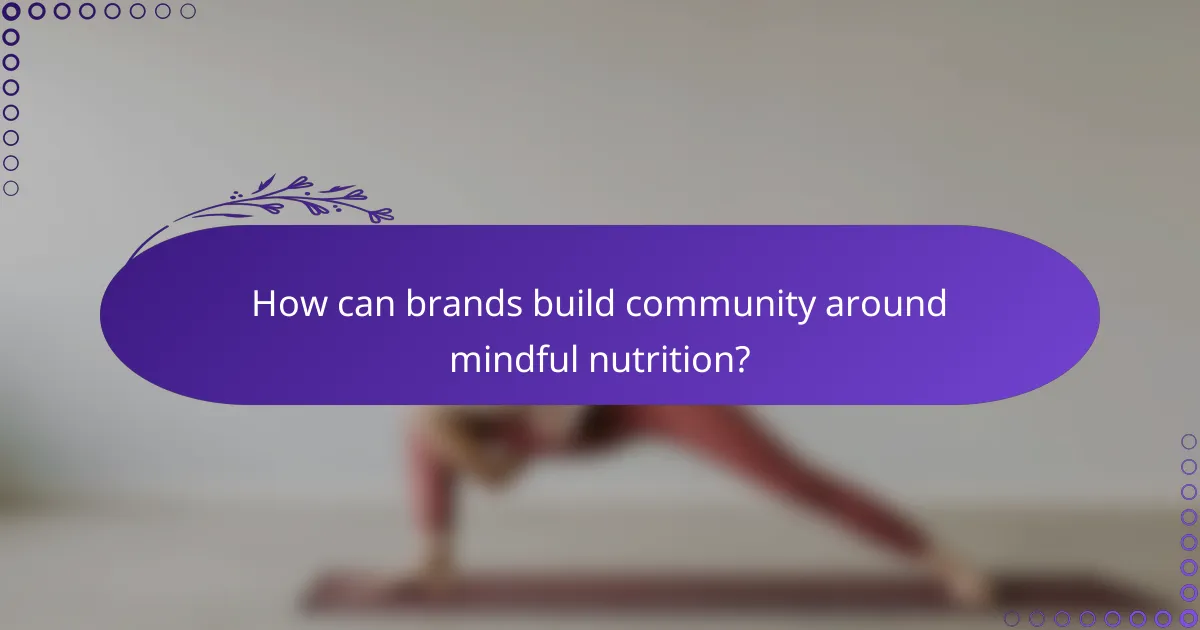
How can brands build community around mindful nutrition?
Brands can build community around mindful nutrition by fostering engagement through interactive platforms, hosting events, and collaborating with key influencers. This approach not only enhances brand loyalty but also encourages shared learning and support among community members.
Creating dedicated groups on platforms like Facebook
Establishing dedicated groups on platforms like Facebook allows brands to create a space where individuals interested in mindful nutrition can connect. These groups can serve as forums for sharing recipes, tips, and personal experiences, enhancing a sense of belonging.
To effectively manage these groups, brands should establish clear guidelines and actively moderate discussions to ensure a positive environment. Regular engagement from brand representatives can help maintain interest and encourage participation.
Hosting virtual events and workshops
Virtual events and workshops provide an interactive way for brands to engage their community while educating them about mindful nutrition. These events can range from cooking classes to nutrition seminars, allowing participants to learn directly from experts.
Brands should consider offering these events at various times to accommodate different schedules and promote them through social media channels to maximize attendance. Providing follow-up resources, such as recorded sessions or downloadable materials, can enhance the value of these events.
Collaborating with influencers in the nutrition space
Partnering with influencers who specialize in nutrition can significantly amplify a brand’s reach and credibility. Influencers can share personal stories and experiences with mindful nutrition, making the message more relatable and trustworthy.
When selecting influencers, brands should look for those whose values align with their own and who have an engaged audience. Collaborations can include sponsored posts, joint events, or co-created content, all of which can help build a vibrant community around mindful nutrition.
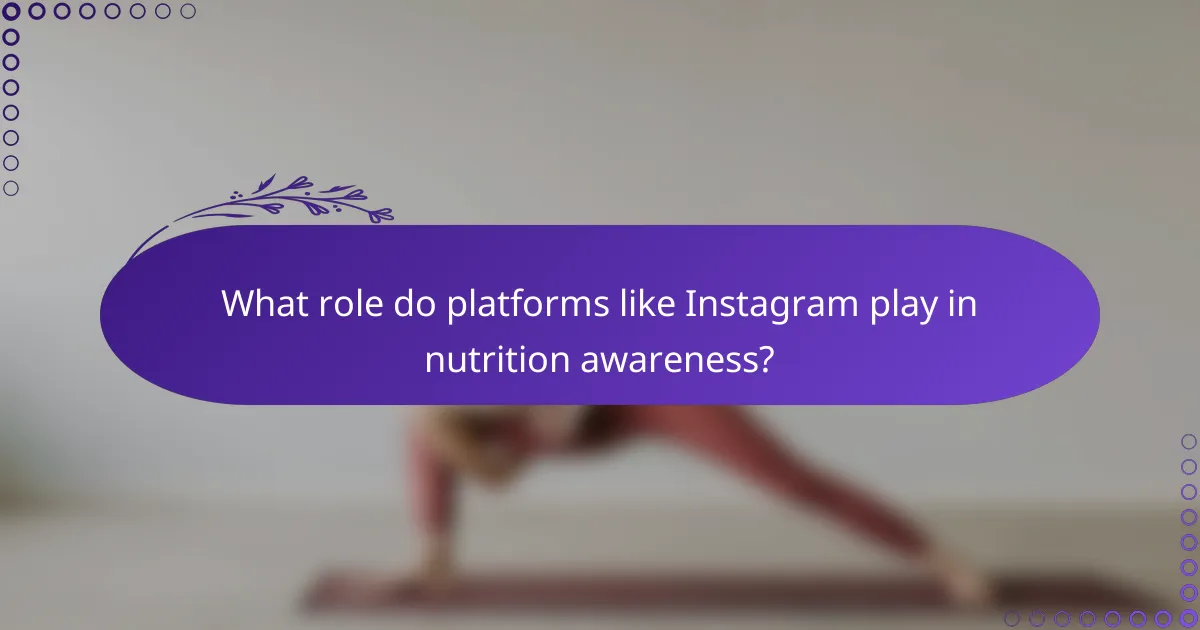
What role do platforms like Instagram play in nutrition awareness?
Platforms like Instagram significantly enhance nutrition awareness by allowing users to share visually appealing content related to healthy eating. Through images and videos, individuals can inspire others to adopt healthier habits and make informed dietary choices.
Visual storytelling of healthy meals
Visual storytelling on Instagram showcases healthy meals in an engaging way, making nutritious options more appealing. Users often post vibrant photos of their dishes, highlighting fresh ingredients and creative presentations that encourage followers to try new recipes.
To maximize impact, consider using natural lighting and colorful plates to enhance the visual appeal of your meals. Simple tips like including a variety of textures and colors can make your posts stand out and attract more engagement.
Influencer partnerships for recipe sharing
Influencer partnerships on Instagram can amplify the reach of nutritious recipes and promote healthy eating habits. Influencers often collaborate with brands or nutritionists to share recipes that resonate with their audience, providing credibility and inspiration.
When selecting influencers, look for those whose values align with your nutrition goals. This alignment helps ensure that the shared content is authentic and resonates with their followers, fostering a sense of community around healthy eating.
Hashtag campaigns for community engagement
Hashtag campaigns on Instagram facilitate community engagement by encouraging users to share their own healthy meal experiences. Popular hashtags like #HealthyEating or #MealPrep can connect individuals with similar interests, fostering a supportive environment.
To create an effective hashtag campaign, choose a unique and memorable hashtag that reflects your message. Encourage followers to use it when posting their meals, which can help build a sense of belonging and motivate others to participate in the healthy eating conversation.
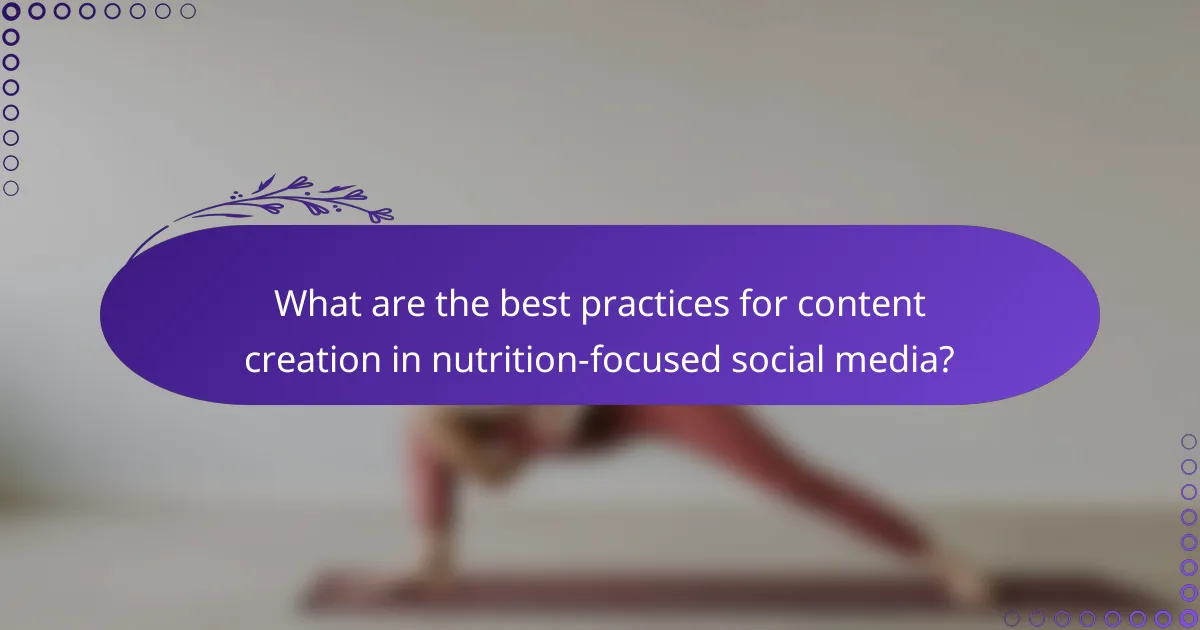
What are the best practices for content creation in nutrition-focused social media?
Effective content creation in nutrition-focused social media requires a blend of accurate information, diverse viewpoints, and consistent engagement. By following best practices, you can build a credible and engaging online presence that resonates with your audience.
Using evidence-based information
Utilizing evidence-based information is crucial for establishing credibility in nutrition-focused social media. This means relying on peer-reviewed studies, reputable sources, and guidelines from recognized health organizations.
When sharing nutritional advice, always cite your sources or link to studies. This not only enhances trust but also encourages informed discussions among your followers. Avoid anecdotal evidence or unverified claims that can mislead your audience.
Incorporating diverse dietary perspectives
Incorporating diverse dietary perspectives enriches your content and makes it more relatable to a broader audience. Recognize that nutritional needs and preferences vary significantly based on cultural, ethical, and personal factors.
Consider featuring content that addresses various diets, such as vegetarian, vegan, gluten-free, or Mediterranean. Engaging with different communities can foster inclusivity and encourage dialogue, helping to build a supportive online community.
Maintaining a consistent posting schedule
Maintaining a consistent posting schedule is essential for keeping your audience engaged and informed. Regular updates help establish a routine that followers can anticipate, which can enhance loyalty and interaction.
Consider using a content calendar to plan your posts in advance. Aim for a frequency that suits your capacity, whether it’s daily, a few times a week, or weekly. Consistency is key, but ensure that quality is never compromised for quantity.
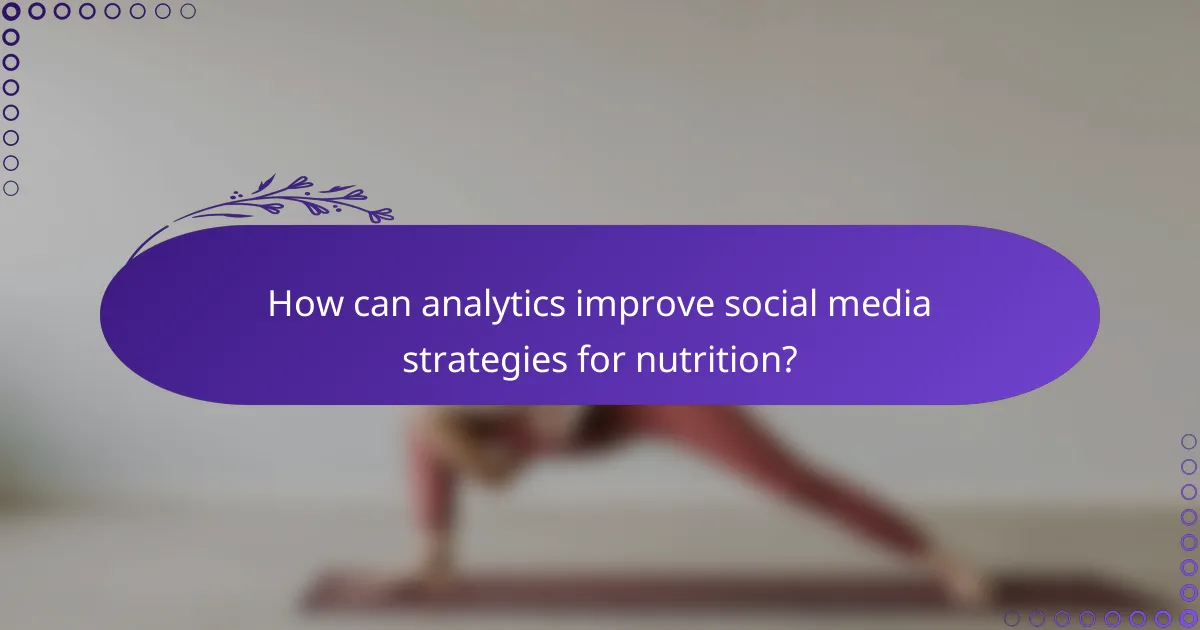
How can analytics improve social media strategies for nutrition?
Analytics can significantly enhance social media strategies for nutrition by providing insights into audience behavior and content performance. By leveraging data, nutrition-focused brands can tailor their messaging, optimize engagement, and build a stronger community around mindful eating.
Tracking engagement metrics
Tracking engagement metrics involves monitoring likes, shares, comments, and overall interaction rates on social media posts. These metrics help identify which types of content resonate most with the audience, allowing brands to focus on successful strategies. For instance, if recipe videos receive higher engagement than static images, brands can prioritize video content in their campaigns.
It’s essential to set specific goals for engagement metrics, such as aiming for a 10-20% increase in interactions over a quarter. Regularly reviewing these metrics can help adjust strategies and improve overall performance.
Identifying audience preferences
Identifying audience preferences requires analyzing demographic data, interests, and feedback from followers. Understanding what topics, formats, and styles appeal to the audience enables brands to create more relevant and engaging content. For example, if a significant portion of the audience shows interest in plant-based nutrition, brands can develop more content around that theme.
Surveys and polls can be effective tools for gathering direct feedback from the audience. Additionally, monitoring comments and messages can provide insights into specific questions or concerns, allowing brands to address them proactively and strengthen community ties.
